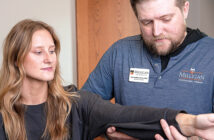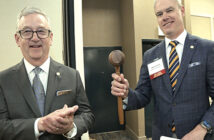Above: Carolyn Powers, IPN Packaging; Carol Blankenship, ABB Bland; Christa Glassburn, PBE Group. Back row: Megan Pack, Woodgrain Millworks; Nichole Manz-Young, Northeast State. Photo by Earl Neikirk.
By Scott Robertson
When the Women in Manufacturing seminar at the Bristol Train Station got underway March 28, one of the first references made by any speaker was to Rosie the Riveter, the World War II era image that has come to symbolize powerful women, especially in the workforce. Yet as the seminar went on, it became apparent that more than one member of the panel was not entirely on board with using that bit of historical iconography to symbolize women in the era of advanced manufacturing.
The image of the woman with her hair in a bandana as she rolls up her sleeves to get to work on the plant floor can bring to mind what manufacturing was like when women were building planes and tanks while men were off fighting World War II. Those often-grimy manufacturing jobs are as much a thing of the past as P-51 Mustangs when compared to today’s advanced manufacturing work environs.
“Manufacturing is not necessarily a dirty thing,” said Christa Glassburn, chief operating officer at the PBE Group in North Tazewell, Va. “Our manufacturing is very clean. There is no dirt in there. I can wear the same clothes to work in that I wear to dinner at night. I can wear my suit. It’s not getting dirty.”
Megan Pack, HR manager at Woodgrain Millworks in Marion, Va., agreed. “When I was little, both my parents worked at a clothing factory that’s no longer here. That was more what people thought of as a typical factory, but it’s not like that anymore. So many things are automated, advanced technology. It’s so much different than it used to be. And I think that puts women more on a level playing field.”
But it’s not just ignorance of the changes in the nature of manufacturing that keep women out of the industry, Pack said. Some women feel uncomfortable even considering a career in manufacturing simply because of their gender. “There has always been a stigma attached to factories. There’s always been stigma attached to women. And I think it’s important for us to acknowledge that and talk about it because that’s the first step in getting past that stigma.”
Nichole Manz-Young, advanced technologies coordinator at Northeast State Community College in Blountville, Tenn., said community colleges are working to help get the word out. “We need to change that perception of what manufacturing looks like for females – that idea that manufacturing is a dirty environment where you’re lifting a whole lot of weight and at the end of the day, you’re always exhausted. Manufacturing is not that way. It has changed.
“One other thing women need to understand is that manufacturing is well-paying work,” Manz-Young said. “Women who work in manufacturing aren’t struggling to make ends meet.”
Carolyn Powers, regulatory and compliance specialist at Scholle IPN Packaging in Chilhowie, Va., said it is incumbent on employers to showcase the opportunities for women in the workplace. “It is such a diverse industry. You can go anywhere with any skill set.”
Still, Glassburn said, it’s not always easy to showcase opportunities when one operates a manufacturing facility. “It’s hard to get young people into manufacturing facilities. Unlike a hospital, for instance, where you can walk the floors with students and show them what it’s like to be an X-ray technologist or a doctor, it’s very difficult to take a 15-year-old student and walk her through a manufacturing facility. Because of that, it’s hard to break through to them.”
To meet that challenge, Glassburn said, the PBE Group is partnering with Southwest Virginia Community College, but the first cohort of students had 14 males and only one female. Young women seem intimidated by what they don’t understand about advanced manufacturing, Glassburn said. “They hear that it’s manufacturing, and that it’s electronics, and they think, ‘I don’t know anything about that.’”
Yet when those same young women do get on the plant floor and see many other women enjoying the work experience, Glassburn said, their outlook changes.
Glassburn credited the Southwest Virginia Alliance for Manufacturing for producing a group of videos that show what an advanced manufacturing workplace looks like, so students can see for themselves without having to jump through the hoops involved in having under-aged individuals on a plant floor.
Perhaps the biggest challenge, though, is the same challenge that faces employers everywhere, regardless of gender or industry. Unemployment is low and the labor pool is weak. “We are in a position now where we are hiring for the first time in eight years,” Glassburn said. “We’re having a really hard time finding employees, whether they’re engineers or whether they’re just people interested in a technical career.”
That’s particularly troubling because unlike most manufacturers, PBE Group has a long history of hiring women. In fact, the workforce is predominantly female. “Our company has been historically female for 30+ years,” Glassburn said. “We have had a lot of female employees who have then pushed their children or their other family members to go into jobs that can come in to us. So, I think the secret sauce is women talking to other women about the fact that they have opportunities in our manufacturing facility, and that it’s not the place they think it was 40 years ago.”




